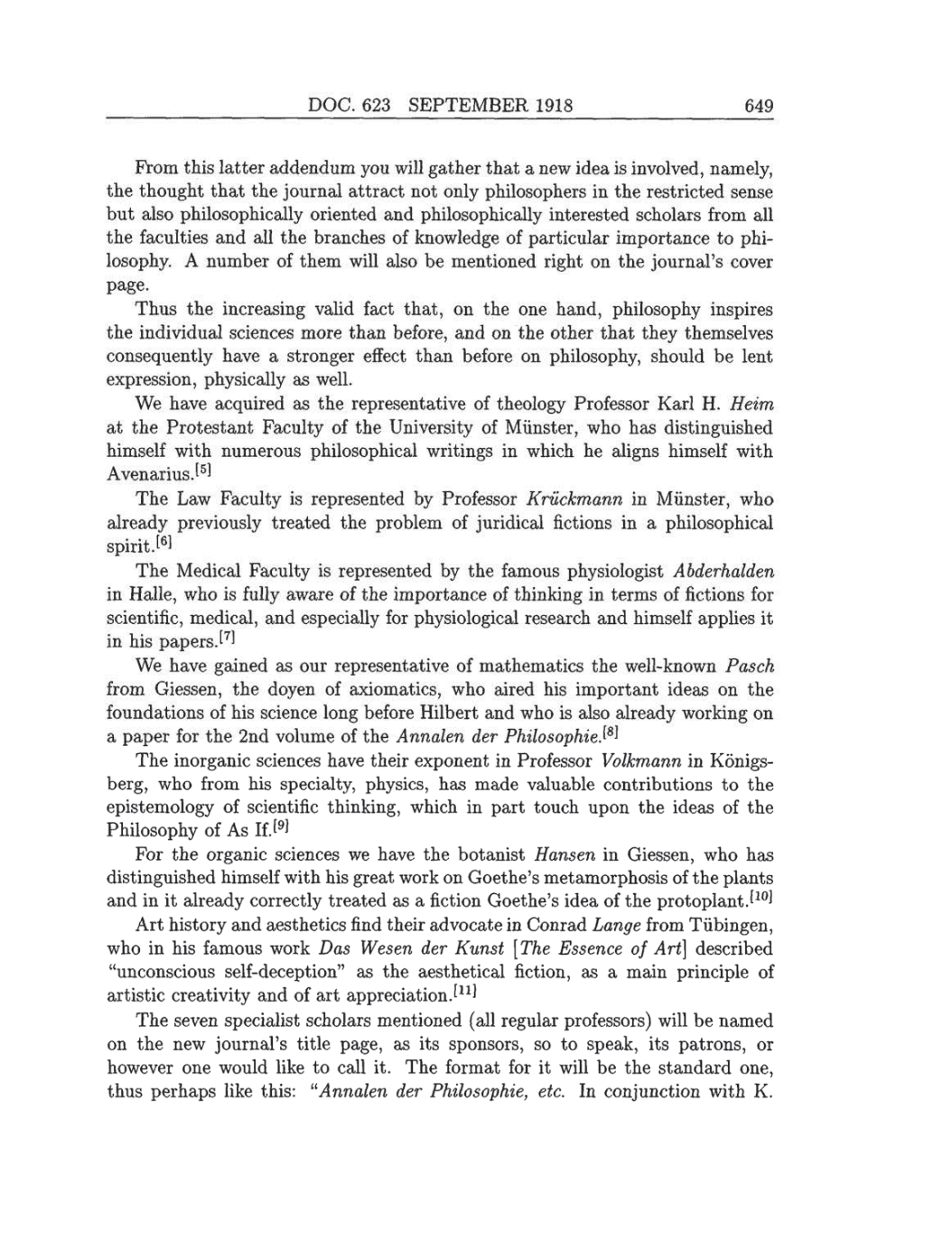DOC.
623
SEPTEMBER
1918 649
From
this latter
addendum
you
will gather
that
a new
idea is
involved, namely,
the
thought
that the
journal
attract not
only philosophers
in
the restricted
sense
but
also
philosophically
oriented and
philosophically
interested scholars from all
the
faculties
and
all
the
branches
of
knowledge
of
particular importance
to
phi-
losophy.
A
number
of
them
will
also be mentioned
right
on
the
journal’s
cover
page.
Thus the
increasing
valid fact
that,
on
the
one hand, philosophy inspires
the
individual sciences
more
than
before,
and
on
the other that
they themselves
consequently
have
a
stronger
effect
than
before
on
philosophy,
should be lent
expression,
physically as
well.
We have
acquired as
the
representative
of
theology
Professor Karl
H.
Heim
at
the Protestant
Faculty
of
the
University
of
Münster,
who has
distinguished
himself
with
numerous philosophical writings
in
which he
aligns
himself
with
Avenarius.[5]
The
Law
Faculty
is
represented by
Professor Krückmann in
Münster,
who
already previously
treated the
problem
of
juridical
fictions in
a
philosophical
spirit.[6]
The
Medical
Faculty
is
represented by
the famous
physiologist
Abderhalden
in
Halle,
who
is
fully aware
of
the
importance of
thinking
in terms
of
fictions for
scientific, medical,
and
especially
for
physiological
research and himself
applies
it
in his
papers.[7]
We
have
gained as our
representative
of
mathematics
the
well-known Pasch
from
Giessen,
the
doyen
of
axiomatics,
who aired his
important
ideas
on
the
foundations
of his science
long
before Hilbert and who
is
also
already working
on
a
paper
for
the
2nd volume of
the
Annalen der
Philosophie.[8]
The
inorganic
sciences have
their
exponent
in Professor
Volkmann
in
Königs-
berg,
who from his
specialty, physics,
has made valuable
contributions
to
the
epistemology
of scientific
thinking,
which in
part
touch
upon
the
ideas
of
the
Philosophy
of As
If.[9]
For
the
organic
sciences
we
have
the botanist
Hansen in
Giessen,
who has
distinguished
himself
with his
great
work
on
Goethe’s
metamorphosis
of the
plants
and in it
already correctly
treated
as a
fiction Goethe’s idea of the
protoplant.[10]
Art
history
and aesthetics find
their
advocate in Conrad
Lange
from
Tübingen,
who in his famous work Das Wesen der Kunst
[The
Essence
of
Art]
described
“unconscious
self-deception”
as
the
aesthetical
fiction,
as a
main
principle
of
artistic
creativity
and of art
appreciation.[11]
The
seven
specialist
scholars mentioned
(all
regular
professors)
will
be named
on
the
new
journal’s
title
page,
as
its
sponsors,
so
to
speak,
its
patrons,
or
however
one
would
like
to call it. The format for
it
will
be
the standard
one,
thus
perhaps
like this: “Annalen der
Philosophie,
etc.
In
conjunction
with
K.
